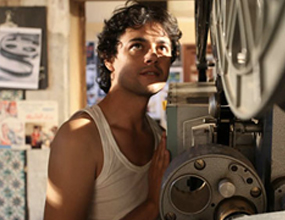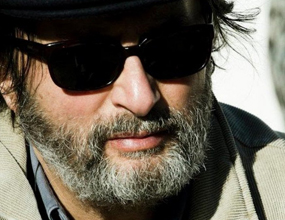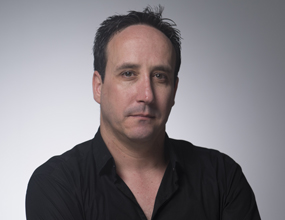La Muerte visita a Gianni, un italiano anciano y senil que vive recluido en un hogar geriátrico, disfrazada de periodista. Antes de cumplir con su misión, le da a Gianni el tiempo suficiente para que le cuente su historia, anotada en un manuscrito. La Muerte busca develar el misterio detrás de una oración que el italiano dejó en sus memorias: “Todo se encuentra en Bab El Fella”. Gianni se niega al principio, pero finalmente acepta y comienza a contarle la historia, dejándolo en suspenso hasta el final. Pero el racconto resultará demasiado esfuerzo para su corazón y Gianni fallece de un paro cardíaco. ¿Finalizará su historia o se llevará el misterio consigo para siempre?
Death, disguised as a journalist, visits Gianni, an old senile Italian who lives in reclusion in a house for the elderly. Before completing his mission, Death leaves the patient with enough time to tell the story that he lived and wrote in a manuscript. He seeks to unravel the mystery of a sentence that the Italian left lying in his writing "All is in Bab El Fella". Gianni refuses at first and finally accepts and begins to tell the story leaving the suspense to the end. But the events will tire his heart and the Italian dies of a heart attack. Will he finish the story or will he take this mystery with him forever?
 Moslah Kraiem, nacido en 1966, obtuvo su máster en Artes en la Columbia College Hollywood en 1989 y se especializó en dirección actoral. Trabajó como asistente de dirección y gerente de producción para varios largometrajes y comerciales previo a dirigir y producir sus propios: Le Cinemonde y el cortometraje Bonne Anée. En 2009, participó de la fundación y gerencia de la empresa Le Comtpoir Mediterranean Film.
Moslah Kraiem, nacido en 1966, obtuvo su máster en Artes en la Columbia College Hollywood en 1989 y se especializó en dirección actoral. Trabajó como asistente de dirección y gerente de producción para varios largometrajes y comerciales previo a dirigir y producir sus propios: Le Cinemonde y el cortometraje Bonne Anée. En 2009, participó de la fundación y gerencia de la empresa Le Comtpoir Mediterranean Film.
Moslah Kraiem, born in 1966, received a Master of Arts from Columbia College Hollywood in 1989, and specialized in directing actors. He worked as an assistant director and production manager for numerous films and TV commercials before he directed and produced his own films: Le Cinemonde and the short film Bonne Année. In 2009 he participated in the founding and management of the company Le Comptoir Mediterranean Film.
Nouri Bouzid relata la historia de todo un país a través el destino de dos jóvenes niñas: Zaineb y Aïcha, símbolos de la Revolución y del futuro de Túnez. Ambas luchan por su independencia, por ganar su libertad. Ambas luchan en contra de los dogmas religiosos y culturales establecidos por una sociedad arcaica. Una sociedad que se encuentra en crisis, y transita entre la modernidad y el tradicionalismo. Zaineb y Aïcha luchan por reconstruirse a sí mismas, a pesar de las presiones sociales y machistas a las que deben enfrentarse cada día.
Nouri Bouzid narrates the story of a whole country through the destiny of two Young girls: Zaineb and Aïcha, symbols of the Revolution and the future of Tunisia. They both fight for their independence, for freedom. They both fight against religious and cultural dogmas established by an archaic society - one which is in crisis, going back and forth between modernity and tradition. Zaineb and Aïcha struggle to rebuild themselves despite the social and sexist pressures they have to face every day.
 Nouri Bouzid nació en 1945 en Stax, Túnez. Estudió cine y comunicación entre Túnez y Bruselas. En 1972, realiza su primer cortometraje Duel.De regreso a su país, entre 1972 y 1973 trabaja en la televisión tunecina. Estuvo en prisión por sus convicciones políticas y al salir, trabajó como asistente de realización en varias películas tunecinas y extranjeras. Luego realizó su primer largometraje L´homme de cendres (“El hombre de las cenizas”), popular por su gran éxito en festivales, y ganador del Tanit de Oro en las jornadas cinematográficas de Cartago en 1986, como así también su película Making Of en 2006. Nouri Bouzi es miembro fundador de la escuela de cine l´EDAC.
Nouri Bouzid nació en 1945 en Stax, Túnez. Estudió cine y comunicación entre Túnez y Bruselas. En 1972, realiza su primer cortometraje Duel.De regreso a su país, entre 1972 y 1973 trabaja en la televisión tunecina. Estuvo en prisión por sus convicciones políticas y al salir, trabajó como asistente de realización en varias películas tunecinas y extranjeras. Luego realizó su primer largometraje L´homme de cendres (“El hombre de las cenizas”), popular por su gran éxito en festivales, y ganador del Tanit de Oro en las jornadas cinematográficas de Cartago en 1986, como así también su película Making Of en 2006. Nouri Bouzi es miembro fundador de la escuela de cine l´EDAC.
Nouri Bouzid was born in Stax, Tunisia, in 1945. He studied Film and Communications in Tunisia and Brussels. In 1972 he shoots his first short film Duel. Back home between 1972 and 1973 he does some TV work. He spent time as a political prisoner and when he got out, he worked as assistant director for several national and international productions. Then he released L’homme de cendres (“Man of Ashes”), popular due to its success at festivals. It won the Golden Tanit at the Carthage Film Festival in 1986, as well as Making Of, his 2006 production. Nouri Bouzi is founding member of film school l’EDAC.
Mustapha, un hombre de negocios de 60 años, es víctima de un accidente en la ruta que lo somete a un coma profundo. Sus cuatro hijos vivirán la situación de una manera diferente, pero ninguno de ellos tendrá tiempo de dedicarle durante su larga convalecencia.La historia sigue a Zhora, una enfermera quien se ocupará de Mustapha. Solos en la gran casa, en la que de vez en cuando aparecerá la vieja Saïda – guardiana de la memoria de la difunta esposa de Mustapha-, Zohra y Musthapa participarán de un curioso paseo.
Mustapha, a 60-year-old businessman, is victim of an accident on the road that leaves him in a profound comma. His four children will experience the situation differently from one another, but none will have the time to be with him during his convalescence. The film revolves around Zhora, a nurse who will take care of him. Alone in the big house, where every once in a while we see old Saïda -guardian of the memory of Mustapha’s late wife- turn up, Zohra and Mustapha will experience a curious journey together.

Mohamed Damak nació en 1952 en Sfax, Túnez. Luego de sus estudios de Cine en Francia, en 1980 regresa a Túnez y realiza su primer documental, L´Espoir (“La esperanza”), en el marco del Festival de Cartago. Luego de realizar dos cortometrajes de ficción, realiza su primer largometraje La Coupe. Se inclina posteriormente por la publicidad, y es en 1994 cuando se acerca a la televisión con Photo-minute, una serie de 15 episodios. Jeudi Après-Midi (“Jueves por la tarde”) es su tercer largometraje.
Mohamen Dama kwas born in 1952 in Sfax, Tunisia. After completing his Film studies in France, he returns to Tunisia in 1980 and directs his first feature documentary L’Espoir (“Hope”), presented at the Carthage Film Festival. After finishing two fiction shorts, he makes his first full-length fiction La Coupe (“The Cup”). He later tries his hand at advertising and in 1994 he approaches television for the first time, directing Photo-minute, a 15-episode show. Jeudi Après-Midi (“Thursday Afternoon”) is his third fiction feature.
Nos encontramos con Mohsen, alias “Bastardo”, un hombre sin orígenes ni historia, que siempre ha sido excluido y rechazado por los habitantes de su barrio pobre. Después de haber sido despedido de su trabajo; Mohsen, gracias a su amigo Khlifa, hace instalar un relé de GSM en su techo a cambio de una renta mensual considerable. Esto perturbará la vida del barrio y la de Mohsen, cuya situación social y financiera mejora día a día. Sin embargo; Larnouba, su amigo de toda la vida, no aprueba este ascenso y una batalla sin cuartel se desata.Una vez librado de su rival y manipulado por su amigo Khlifa, el camino de Mohsen queda libre para convertirse en el hombre más poderoso y respetado del distrito.
Meet Mohsen, a.k.a Bastardo, a man with no origins or history who has always been excluded and rejected by the inhabitants of his poor neighborhood. After being fired from his job; Mohsen, thanks to his friend Khlifa, has a GSM relay installed on his roof for a substantial monthly income. This will disrupt life in the neighborhood and Mohsen’s ─whose social and financial situation improve by the day. But Larnouba, Mohsen’s life-long friend, doesn’t approve of Mohsen’s ascent. A merciless fight begins.Ridden of his rival and manipulated by his friend Khlifa, Mohsen’s path is clear to become the most powerful and respected man in the district.
 Nejib Nació el 13 de mayo de 1972 en Túnez, República Tunecina. Luego de estudiar Administración y Marketing en Cartago, Túnez; incursionó en el cine y el teatro como actor. Su primera oportunidad de dirigir llegó en 1999 con un programa de televisión en el Canal +Horizons. En 2002, fundó Propaganda Production con su amigo y cómplice Imed Marzouk. En 2005 dirigió su primer cortometraje, Tsawer ("Foto") que fue seleccionado en más de 30 festivales de cine alrededor de 11 países. VHS-Kahloucha, documental de 82 minutos producido en 2006, tuvo su estreno mundial en el festival de Cannes ese mismo año, fue seleccionado en 50 festivales de cine, compitió en el Festival de Cine de Sundance en 2007 y ha ganado varios premios.
Nejib Nació el 13 de mayo de 1972 en Túnez, República Tunecina. Luego de estudiar Administración y Marketing en Cartago, Túnez; incursionó en el cine y el teatro como actor. Su primera oportunidad de dirigir llegó en 1999 con un programa de televisión en el Canal +Horizons. En 2002, fundó Propaganda Production con su amigo y cómplice Imed Marzouk. En 2005 dirigió su primer cortometraje, Tsawer ("Foto") que fue seleccionado en más de 30 festivales de cine alrededor de 11 países. VHS-Kahloucha, documental de 82 minutos producido en 2006, tuvo su estreno mundial en el festival de Cannes ese mismo año, fue seleccionado en 50 festivales de cine, compitió en el Festival de Cine de Sundance en 2007 y ha ganado varios premios.
Nejib was born on May 13th 1972 in Tunis, Tunisia. After studying management and marketing in Carthage, Tunisia, he went into film and theatre as an actor. His first shot at directing came in 1999 with a TV show on Canal +Horizons. In 2002 he founded Propaganda Production with his close friend and accomplice Imed Marzouk. In 2005 he directed his first short film Tsawer (“Photograph”). It was selected in over 30 film festivals in 11 countries.VHS-Kahloucha, an 82-minute documentary produced in 2006, premiered at Cannes film festival that same year, was selected for 50 film festivals, competed at The Sundance film festival in 2007 and has won several awards.